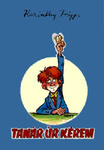What do you think?
Rate this book


88 pages, Paperback
First published January 1, 1916
b-squared-minus-plus-minus-squared-square-root-b-minus-4-times-ac-times-2-times-a.
And the unprepared student starts writing obediently, and then reads the numbers out loud. He keeps writing and writing, just like [literary character], he knows what it's all about, sees the thesis, “just like that night”, when he fell asleep next to it and had no idea what it was about, what it all meant. Surely this must be it, he suspects vaguely, some sort of second degree equation – but what will it become?

I was still a child, when my relatives would ask me things like, “you're going to let the little miss stand while you're sitting down? Aren't you ashamed of yourself? What kind of gentleman will you become?”.
I then had to get up from the comfortable chair, so that the lace-covered little monkey could sit down. My face was burning from embarrassment and anger.
"Why?" I would ask myself, "Why? What kind of stupid, unlawful and unfair privilege was this?"
If I slapped her, she'd fall off the chair. But she is allowed to slap and humiliate me, just because she's weaker, and I can't retaliate out of chivalry? Can't they see, that she knows all this and is laughing at us, while she sprawls comfortably on the chair?

I simply nodded and mentioned, that my family was already in possession of FOUR bathtubs: one in the dining room, one in the office and two in the wigwam. However as far as I knew, my folks were about to purchase an additional five, out of which two had magic lanterns screwed on, along with a small device that made the tub move on its own: walk, turn, and even levitate a bit.
